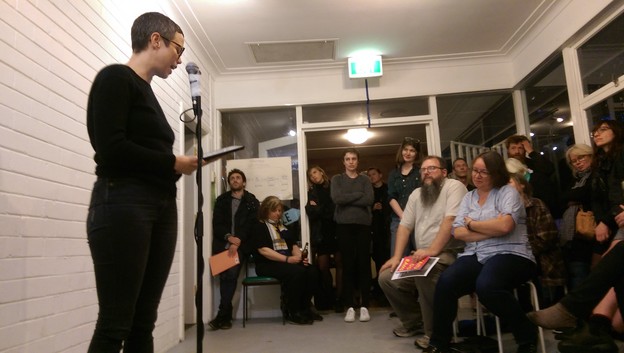I've been in this room before: Astrid Lorange

On a very rainy afternoon on the 18th of September, in a shared art space in Marrickville, Sydney (Frontyard), nine poets read their work: Astrid Lorange, Pam Brown, Alison Coppe, Emily Stewart, Yasmin Heisler, Holly Isemonger, catherine vidler, Dave Drayton and Nick Whittock. The reading was organized by SOd Press, an Australian small press focusing on radical poetics: a press begun by a.j. carruthers and now a collaborative project between myself and him.
The afternoon was a celebration of many things: a “launch” of the SOd.doc series, which has for the past year been showcasing feminist, visual postdigital work, the latest instalment of which is “chaingrass,” a long poem by catherine vidler of kaleidoscopic patterns based on the word “chaingrass.”[1] The party also marked the launch of stand-alone chapbooks and a magazine.
This post could be about any of the poets who read: Nick Whittock’s discombobulating cricket tables, Alison Coppe’s urgent viscerality, a.j. carruthers’s provocative introductory words, or, if the party was in another time, another place, other SOd poets, such as Jessica Mei Cham, Ivy Alvarez, Mez Breeze, Aurelia Guo, Pascalle Burton, Benjamin Laird, WeiZen …
But Astrid Lorange is a particularly appropriate poet to close this series, concerned as her poetics is with reading, writing, speaking, desiring, eating, excreting and medicated bodies. Her work articulates a poignant, traumatic relation between text and flesh — the realization that your body is not your own under capitalism and has never been yours — your flesh is contracted out and written on by external forces.
Lorange’s chapbook “Ex” (published with SOd) describes living with a contemporary cybernetic body: pheromones, “little sketchy / techs” are wiped on, “machine-like,” as a complex substitute for sweat and poetry:
In lieu of writing, I wipe on my
pheromones left to right.[2]
Lines from “Ex” reappear in a collaboration between Lorange and Andrew Brooks for the exhibition “Little Pharma.” In the chapbook for the exhibition, “Ex” is interpolated with “Contract Or.” The latter takes the form of paragraphs of lists of administrative categories, legalese, environments and bodies that have been inscribed by bioscience or “little pharma”:
autofill, exit strategy, a release or
loosening, ‘part of the making of what
they say,’ the outsourcing of legal
subject-status to character actors,
counter-embodiment, headstone
engravings, coping mechanisms, stool
softeners, antacids, arsehole bleaching;[3]
Ostentatiously a body and a voice irrevocably mediated by technology, Lorange incorporated a prerecorded reading of “Contract Or” into the SOd reading. Lorange spent several minutes of the reading with her smartphone held up to the microphone, playing the recording. Lorange’s prerecorded vocalization of “Contract Or” was framed by the live reading of new material, material which reflected on “reading and fantasy,” positioning the two in a parasitic, nurturing, reflexive, masochistic relationship, depending “on one thing inside another, or one thing standing next to another, pointing as in a portrait.”[4]
Lorange’s reading at the SOd event presented the act of reading one’s work as an uncanny return, with phrases like: “I’ve been in this room before, backlit by little halfchewed trinkets.” Then, through the recording of “Contract Or,” Lorange stood at a remove from her own vocalization of her work, amongst multiple poems, multiple voices, multiple temporalities. Conventional poetry readings involve the vocalization of work that has already been written (sometimes months or years past), and thus the poet uncovers, ventriloquizes and fantastically reconstructs past thoughts, past practices, past voices. Reading old work is potentially to be haunted or possessed by a writing body and a fantasy that might since have been overwritten or disavowed (an “Ex”).
Lorange’s deeply felt poetics eruditely and tenderly meditates on reading, fantasy, repetition, deferral, but perhaps most urgently, the problem of what it means to be a body reading poetry at this time, in this space.
1. catherine vidler, “chaingrass” (SOd Press, 2016). See also vidler’s website.
2. Astrid Lorange, “Ex” (SOd Press, 2016).
3. Astrid Lorange and Andrew Brooks, “Little Pharma” 2016.
4. Many thanks to Astrid Lorange for providing me the script for her reading.
Sydney reading experiments: Poetry in performance